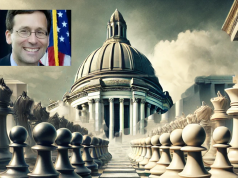
After President Donald Trump threatened to send immigrants into “sanctuary cities” across the country, Seattle mayor Jennie Durkan responded that her city “isn’t afraid of immigrants.” The mayor fired back in a Washington Post op-ed that her city has “always welcomed” immigrants.
“Contrary to what this President thinks, in Seattle, we have strong American values of inclusiveness and opportunity,” Durkan wrote. “Instead of threatening immigrant families and the cities that welcome them, this President should spend a little bit more time trying to learn from us.”
Durkan wrote that immigrants, who make up 18% of the city’s population, make Seattle “a stronger, more vibrant place” and make contributions to business, culture, law enforcement and other parts of its society.

She noted that the city already has programs in place to help immigrants succeed while living in Seattle. These include a program to offer tuition-free college to all public high school graduates – regardless of their immigration status; the Ready to Work Program, which aims to provide immigrants with case managers and English language education; and the New Citizen Campaign, a program to help legal permanent residents become citizens.
Durkan wrote that Seattle will continue to stand up to the President: “So if this President wants to send immigrants and refugees to Seattle and other welcoming cities, let me be clear: We will do what we have always done, and we will be stronger for it. And it will only strengthen our commitment to fighting for the dignity of every person. We will not allow any administration to use the power of America to destroy the promise of America,” Durkan wrote.
Immigration Driving Innovation
To deny the positive effects of immigration within our high-tech community is a misguided combination of xenophobia and ignorance.
Immigration policies in the pre-Trump era allowed Sergey Brin to emigrate to the United States with his family and found Google, for Elon Musk to immigrate and found Tesla, or for Mike Kriger to immigrate from Brazil and found Instagram to cite just three of numerous examples.
A tragic example is Eric Yuan who was repeatedly denied before finally making it to Silicon Valley and founding Zoom, one of the top tech startup/IPO stories in recent memory.
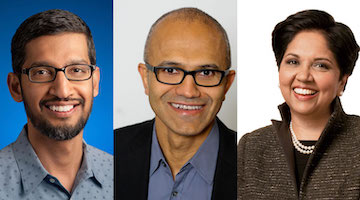
Microsoft CEO Satya Nadella has warned that countries that fail to attract immigrants will lose out as the global tech industry continues to grow. “People will only come when people know you’re an immigrant-friendly country,” he said this week in Davos.
The Indian immigrant was born in 1967, just two years after the passing of the now largely forgotten Hart-Celler Act into law. Before Hart-Celler, only 100 Indians were allowed into the United States each year and getting permanent residency — the coveted Green Card — which remains a rite of passage for every immigrant today — was next to impossible.

Going Online to Get Out of Line
Seattle startup Boundless proudly stands alongside Mayor Durkin, arms locked in solidarity, against the regression of oppressive government policies and the villainization of immigrants seeking lawful migration to America.
Boundless integrates software and legal services for people who want to tap the expertise of an immigration attorney without the price tag. Through Boundless, you can apply for a marriage green card for only $950 and your own immigration attorney is included at no additional cost.

Xiao Wang is the co-founder and CEO of Boundless. Prior to Boundless, he held leadership roles at Amazon Go, Providence Equity, the NYC Department of Education, and McKinsey. Xiao holds a BA/MS from Stanford University and an MBA from Harvard Business School.
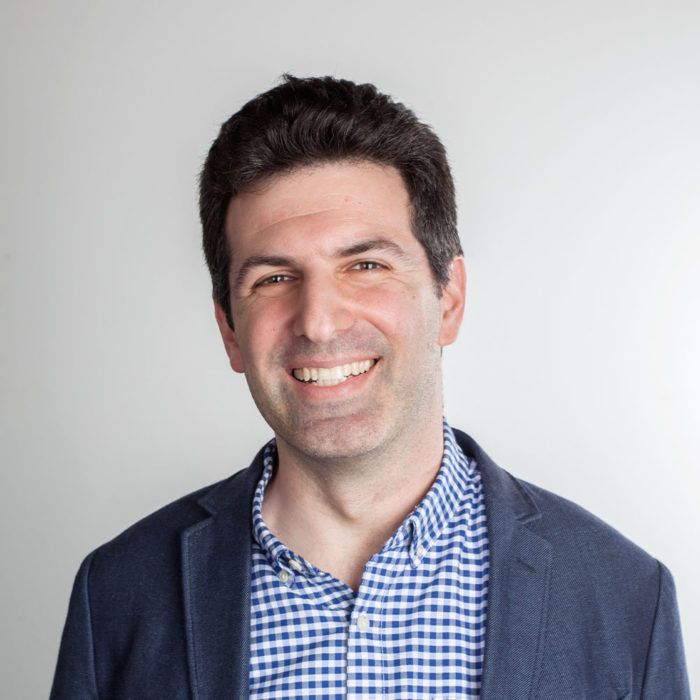
Boundless co-founder and president Doug Rand served in the White House during the Obama administration where he spearheaded the International Entrepreneur Rule that allowed foreign-born entrepreneurs to stay in the United States for up to five years to expand their businesses.
This week, Boundless joined with dozens of other companies including Microsoft, Twitter, LinkedIn, Reddit, Redfin, and over 100 others, in becoming a signatory to an Amicus Brief challenging yet another proposed Trump administration policy on a new “public charge” rule that further restricts immigration eligibility based on financial status.
Let’s explore, as Boundless would say, how the Seattle-based company “empowers families to navigate the immigration system more confidently, rapidly and affordably.”
Seattle24x7: Welcome, Xiao. When did Boundless officially open its doors and how long was it before you were running at full speed?
Xiao: The pain of the immigration process has been a part of my life since I was young. My parents and I left everything to come to this country nearly 30 years ago, and at that time, we paid a lawyer nearly five months of rent to complete our green card application because it was so high stakes and we didn’t know if we were doing it right. Sadly, the only things that have changed in the three decades since are that the process has gotten more complicated and the lawyer fees have gone up.
We officially formed as a company in February 2017, but did not release the first version of our product for marriage green cards until September of that year. We launched on stage at TechCrunch Disrupt and immediately the problem resonated with families. In fact, we had someone pay us even before the product was fully built yet, as they were so desperate for help and so relieved that we existed.
In some ways, we were always running at full speed and in others, we’re never at full speed. For the former, as an early-stage startup, we are always trying to do as much as possible with a limited pool of resources. For the latter, we still have so much to go in terms of being that trusted partner for all immigrant families that we can always do more.

Seattle24x7: As a young man, you learned some valuable lessons going through the immigrant experience first-hand with your family?
Xiao: My parents’ childhood was interrupted by the Chinese cultural revolution. While they were in middle school, the communist government shut down all the schools and sent children into farms and factories. While there, my parents studied every night with black-market books from seventh grade through college. After finishing a full day of work in the fields, they would secretly light candles and work on problems on their own, night after night, clinging to the hope that schools will eventually open again. ‘’
When they did, my parents were able to test directly into Master’s programs. Eventually, the government allowed people to leave the country, and they gave up everything to immigrate to America.
They always believed that the best education and opportunities for me were here. What they failed to realize was how difficult it would be to break into the American corporate ladder.
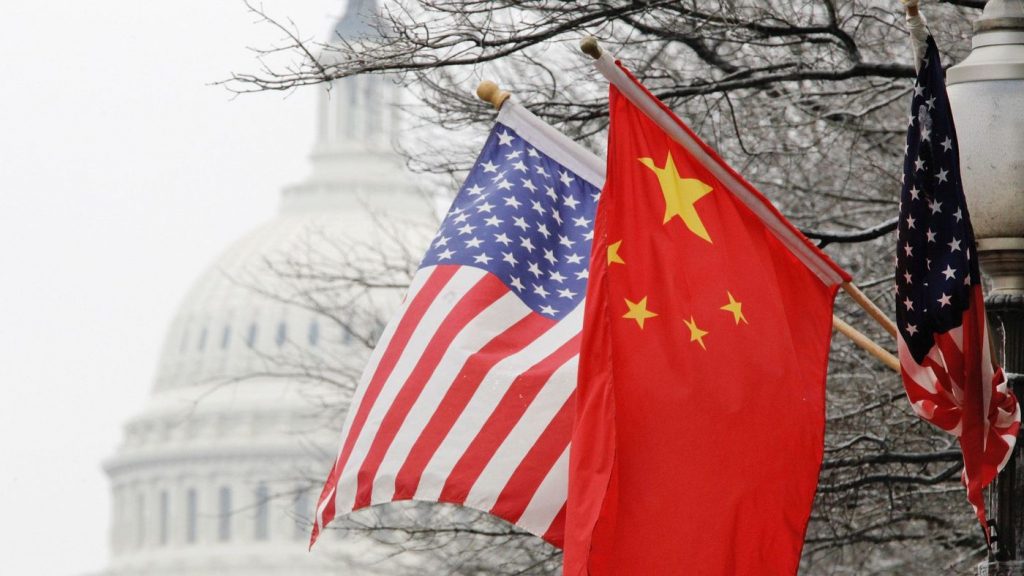
I watched my dad, with two masters degrees, do menial work because he was waiting for his green card and couldn’t leave his company. I watched my mom, with a ph.D., stuck in a group with other immigrants with no hope of advancement. I saw both of them work tirelessly year after year to learn new programming languages and skills because they knew they could never break into management.
In order to stay employed they had to continuously compete with new graduates for technical jobs. I could see that same path in front of me if I were to do just what was expected. To stay quiet, study hard. I was told repeatedly growing up that if I and a white person would be up for the same position, I would always lose.

And so, I decided to do something different. I joined marketing and business clubs. I worked through school. I did sports. I looked for every opportunity to do things where no one else looked like me. I looked for affirmation from being good at something Asian people weren’t expected to do. And in doing so, I gained the confidence to rise above the bamboo ceiling of a smart, hard-working doctor, lawyer, or engineer that I saw others in my community aspiring for. Over time, that became my “why”. Becoming good at things I wasn’t expected to be good at made me feel like I could have opportunities my parents never had a shot at.
Seattle24x7: That eventually included running marathon races — and triathlons!
Xiao: It wasn’t until I discovered long-distance running that I found a niche that didn’t reward talent as much as sheer tolerance of boredom and pain. And since I was used to that, I slowly got better. Over two decades of grinding, I went from being lapped in the 1600m, 4-lap race to nearly placing in the top 100 at the Boston and Chicago Marathons. I then found triathlons, which rewards slow people who loved suffering even more, culminating in qualifying for the Ironman World Championships in Kona and being sponsored by Wheaties, Michelob Ultra, and more.
Seattle24x7: Speaking of leaps and bounds, you were bound and determined to start your own business with Boundless. What is the main point of difference between using Boundless for its immigration services and using a private attorney?
Xiao: Traditionally, families are caught between two confusing and potentially tragic options. They can, if financially possible, spend thousands of dollars on a lawyer, with little idea of quality. Or, they can try and do it themselves, spending weeks or months trying to painfully research what to do, with little confirmation if they’re doing it right. This is a story repeated millions of times per year by those looking to immigrate to the U.S.
That’s why I was so compelled to create Boundless, to provide access to all families the tools, information, and support previously only available to those who could afford high-priced attorneys. Boundless helps families identify what they are eligible for, completes the right forms accurately, and provides families a vetted, high-quality immigration lawyer, all for a fraction of the price of a traditional lawyer.

In summary, Boundless customers get all the benefits of having a lawyer help them with legal immigration strategy and ensuring the applications are completed accurately at significantly lower costs. The difference with Boundless is that (1) they don’t get to meet their lawyer face-to-face, which some consider a benefit, (2) the lawyer engagement ends when the application is submitted to the government, so they won’t accompany the applicant to their interviews.
Seattle24x7: What are the risks involved in attempting to navigate the immigration process on one’s own without the support of a counsel like Boundless?
Xiao: The risks of submitting inaccurate applications have sadly gotten higher over the past year. The US Citizenship and Immigration Service (“USCIS”) may start denying any application that lacks a required document, forcing the applicant to re-apply and pay the entire government filing fee again. (Those fees are currently up to $1,760 for marriage green cards, and supposed to increase next year.)
For any applicant who lacks immigration status at the moment their application is denied, USCIS may immediately place them in removal proceedings — a lengthy and expensive court process that could result in deportation.
And here’s the bottom line: It’s never been more important to file your visa application completely and accurately the first time. Once a visa application is denied, the applicant has to start all over again, filing an entirely new application, paying the government fees a second time, and going to the back of the line.

USCIS announced a new policy that encourages its officers to deny any imperfect visa application without first giving the applicant an opportunity to fix the problem.
The best way to prevent a denial is to include all the required forms and documents when you first submit your application, completely and correctly.
Boundless has prepared detailed guides on how to get it right the first time, including:
- What documents are required for a marriage-based green card
- How to create flawless digital documents
- Translating documents into English
- How to prepare hard-to-find evidence
- Address history tips
- Employment history tips
With Boundless, you get an experienced independent attorney to review all of your materials and answer your questions.
Seattle24x7: Boundless focuses on applications for a Spousal Green Card as well as U.S. Citizenship naturalization? What does it advise for H-1B candidates?
Xiao: We currently focus our efforts on spousal green cards and naturalizations, and do not assist with H-1B applications. There are a number of great attorneys we have worked with in the past for employment-based applications, and we often encourage our customers to find local immigration legal help (our customers come from all 50 states and around the world) for employer-sponsored immigration.
The H-1B program, which lets employers hire skilled workers, has come under fire from Trump, and while few clear policy shifts have been implemented, there’s evidence that applications are being denied at much higher rates on Trump’s watch. The administration is also planning to scrap work authorizations for H-4 visa holders, effectively barring H-1B holders’ spouses from working in the United States. The “family-based” immigration process, as they tend to have the least options (many employers help their employees with H-1B and other employment-based immigration applications).

Seattle24x7: Your co-founder Doug Rand served in the White House during the Obama administration where he helped develop the International Entrepreneur Rule rule as a way to spur innovation. The rule allowed foreign-born entrepreneurs to stay in the United States for up to five years to expand their businesses, granted they could prove their companies’ potential for rapid business growth and job creation. What is the current status of that program?
Xiao: The rule actually went into effect in March 2018, as Form I-941, Application for Entrepreneur Parole. In May 2018, USCIS announced plans to rescind the rule. Due to the uncertainty around the longevity of the policy, under 10 people have actually applied.
Seattle24x7: Looking at the bigger picture, what are the key trends in immigration in terms of country or region of origin?
Xiao: Overall, immigration has declined over the past three years, from over 1 million in 2017 to ~600,000 in 2019, likely due to the amount of uncertainty and change in the U.S.’s immigration policy under the current administration. While USCIS hasn’t released 2019 numbers, looking at trends from 2018 the decline has come from Asian and European countries.
Seattle24x7: What is the key driver of immigration in the United States?
Xiao: My personal perspective of the key driver of immigration to the United States is the same as it has always been. My family, like millions of families before and after us, came to this country to pursue new opportunities and to form a better life.
In the current debates, the largest misunderstanding is about immigration and the economy.
Seattle24x7: What is that misunderstanding?
Xiao: Immigrants have a net positive impact on the economy overall. There are so many studies on this topic, but overall, in the long-run, immigration has a meaningful positive impact on the economy. First and second generation immigrants represent almost 50% of the Fortune 500 CEOs. That doesn’t mean that immigration doesn’t need to be managed or that we shouldn’t also invest in education and social services programs, but that any argument based on immigration as a drain on our economy is not on firm footing.
The most prolific startup markets in the country are flush with foreign-born founders
Percentage of immigrant entrepreneurs among U.S. metro areas
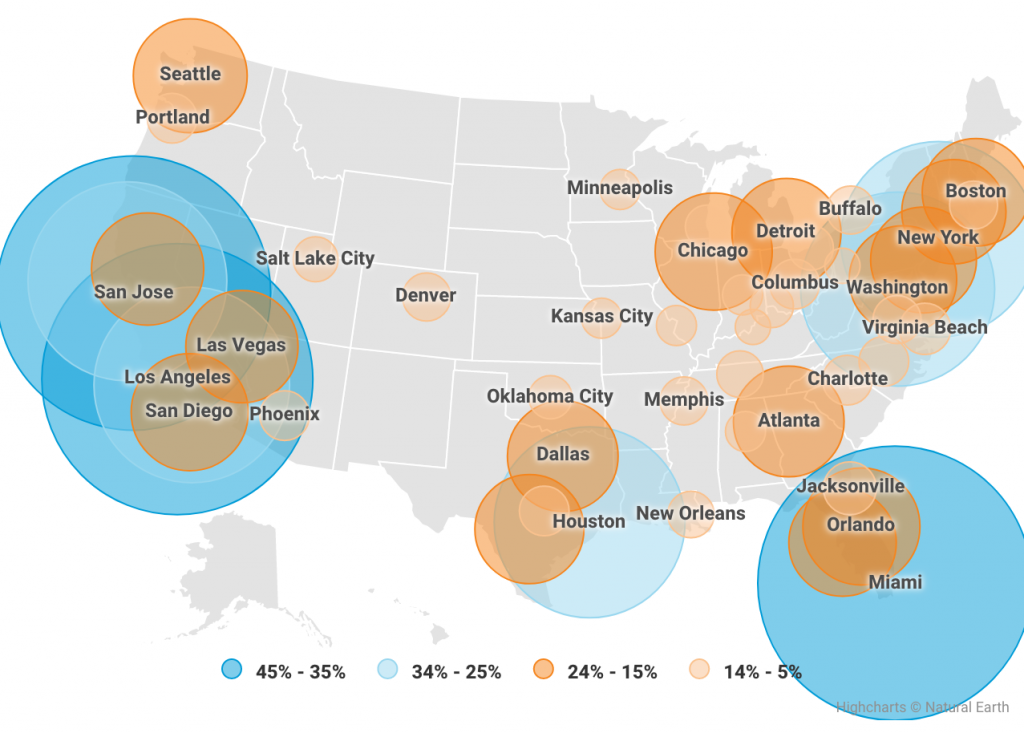
Seattle24x7: What is the average wait time for a Spousal Green card? For U.S. citizenship? Has that time been increasing?
Xiao: For Spousal Green cards (foreign national married to U.S. citizen) and naturalization it’s averaging ~12 months. This time has nearly doubled from 2016, when they averaged 5-7 months. Work and travel permits have also doubled.
Seattle24x7: Are children of a spouse from a former marriage eligible for inclusion in a Marriage Green Card?
Xiao: Yes, they can apply for a green card as part of the application.
Seattle24x7: What is the economic contribution of immigrants vs. American-born citizens in terms of starting new businesses?
Xiao: Immigrants start businesses at a ~2x higher rate than U.S. born adults, and have founded half of the country’s most valuable startups.
Seattle24x7: You are part of a “Friend of the Court” Amicus Brief arguing against a new rule proposed by the Trump Administration that makes elegibility and qualification for immigration more onerous. Over 100 tech companies have joined the brief including commitments and signatories from Levi Strauss, LinkedIn, Microsoft, Reddit, Redfin, Shutterstock and Warby Parker in addition to several other Seattle-based companies? What can other interested companies or individuals do to support the initiatives against these rules?
Xiao: Number one, sign onto our brief! We filed the first of seven briefs and could always use additional supporters for future efforts. Next, talk about these important issues with your local elected officials. They are always looking for tangible stories around how our region’s prosperity or humanity is hampered by government policy.
Seattle24x7: What are the major obstacles that the Trump administration is putting in the way of legal immigration?
Xiao: So many! Higher fees, changing policies, a public charge rule, health insurance mandates, higher stakes for incomplete or inaccurate applications, and more.

The Border Wall
The subject of chants at countless rallies, the border wall, remains a key symbol of Trump’s immigration policies. Raising money for the massive project — which critics call an ineffective boondoggle — has proven tough, and as of April 2019, just 39 miles of the planned 2,000-mile wall had been built. Such hurdles have driven Trump to talk up the threat from migrant caravans, send troops to the border, and use the threat of family separation to deter asylum-seekers.
Travel Restrictions for Muslims
Trump’s push to ban immigrants and temporary visitors from majority-Muslim countries won vocal support from his base, but was branded racist and unconstitutional by critics. Courts initially struck down the travel ban, but after several do-overs, the Supreme Court signed off on a somewhat softened version of Trump’s policy in mid-2018.
Dismantling DACA
The Obama-era Deferred Action for Childhood Arrivals (DACA) program gave Dreamers — undocumented immigrants brought to America as children — the right to live and work in the United States. President Trump rescinded the program in 2017, and his efforts to trade protections for Dreamers for funding for his border wall fell flat. DACA recipients remain in limbo while lawyers argue over the program’s future and Congressional Democrats seek a deal to permanently protect Dreamers.

Deporting Temporary Protected Status Holders
President Trump is seeking to deport up to 98% of Temporary Protected Status (TPS) holders, who gained the right to live and work in America after their home countries were hit by conflict or natural disasters. Democrats have sought to fold protections for TPS holders, many of whom have been here for decades and have American-born children, into legislative efforts to protect Dreamers.
Stricter “Public Charge” Rules
Arguably the Trump policy with the most potential to radically reform the U.S. immigration system is the public charge rule — which focuses on how immigrants who use public benefits like Medicare are treated — could slash legal immigration by more than 50 percent. In some cases, the new rule could even be used to deport current green card holders who make use of public benefits. Federal courts put the public charge rule on hold for domestic applicants, but the government is appealing — and in the meantime, the rule remains in place for people seeking visas from outside the United States.
Health Insurance a Must-Have
In a move intended to complement and expand the public charge rule, President Trump used his executive authority to order government officers to deny visas to would-be immigrants who couldn’t show that they would purchase health insurance within 30 days of arriving in the United States. Like the public charge rule, the health insurance requirement was frozen by a federal court pending legal challenge.
Tough Times for International Students
In 2018, USCIS implemented new rules that would leave international students subject to “unlawful presence” penalties — potentially including lengthy bars to re-entering the United States — for relatively innocent infractions such as working too many hours in a campus job. The policy was suspended by a federal judge in May 2019, and remains subject to litigation

Bad News for Naturalized Citizens
The Trump administration is threatening to strip some naturalized immigrants of their U.S. citizenship, and seeking more than $200 million in funding for an effort to investigate up to 700,000 immigrant files. While the policy is unlikely to impact the vast majority of new Americans, it’s a major shift for naturalized immigrants who have long enjoyed an “assumption of permanence” after gaining citizenship.

Taking Aim at Family-based Immigration
The RAISE Act, which Trump endorsed in 2017, aims to halve the number of family green cards issued each year, while offering temporary visas for the parents of U.S. citizens. With Democrats able to block the legislation’s progress in Congress, the RAISE Act was “dead on arrival”; still, Trump’s son-in-law, Jared Kushner, resurrected some of its goals in early 2019 with a poorly received roadmap for immigration reform that would make it far harder to obtain family reunification visas.
Seattle24x7: What would the Trump administration’s proposed public charge rule mean for those applying for immigration?
Xiao: The public charge rule will add significant burden and complexity to everyone applying for a visa or green card, will reduce the number who qualify, and likely slow down the process dramatically.
Under the rule, green card and other visa applicants could be denied not for being “primarily dependent on the government for subsistence” (the current standard) but instead for being “more likely than not” to use certain public benefits at any point in the future. This will require significantly more paperwork from each applicant (we’re estimating ~100 pages of evidence) that cover their credit score, education history, medical history, employment certifications, debts, and more. Government adjudicators will then need to make a determination based on this evidence if an applicant is likely to use benefits in the future, an opaque and subjective criteria.
Seattle24x7: Immigration is also becoming a more expensive process?
Xiao: Yes, immigration isn’t just getting more difficult under Trump — it’s also getting much more expensive. A new round of USCIS fee hikes planned for 2020 will see the cost of getting a green card increase by 56%, from $1,760 to $2,750, and the cost of citizenship jump more than 80%, from $640 to $1,170. That’s a huge increase, equivalent to 14 times the rate of inflation since 1985 — and controversially, 28.5% of the fee hike is earmarked to pay not for improved administrative services, but to help fund enforcement activities and deportations. Don’t count on getting a fee waiver, either: the eligibility requirements for hardship waivers have been significantly tightened since Trump took office.
Seattle24x7: Why are Trumps’s executive powers in regard to immigration considered to be legal? Don’t these changes need to be legislated by Congress? Is an adverse court ruling appealable to the U.S. Supreme Court?
Xiao: There is significant debate about the degree to which executive actions can legally shape immigration policy without Congress. Due to the gridlock in the legislative branch, most immigration policies end up being driven by USCIS and the State Department, such as DACA under the Obama Administration. The question being debated in courts now is how much can the policies change under the premise of national security without the passing of more comprehensive immigration reform through Congress.
For the public charge rule specifically, since appellate courts have had different opinions, we believe that the Supreme Court will weigh in on (1) if the current legal injunction keeping the rule from going into effect is allowed, and eventually on (2) if the policy itself is constitutional. [24×7]
For more information on Boundless Immigration, visit the Website.












